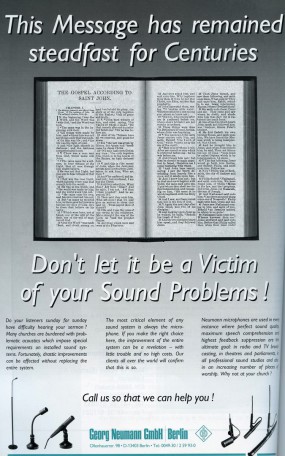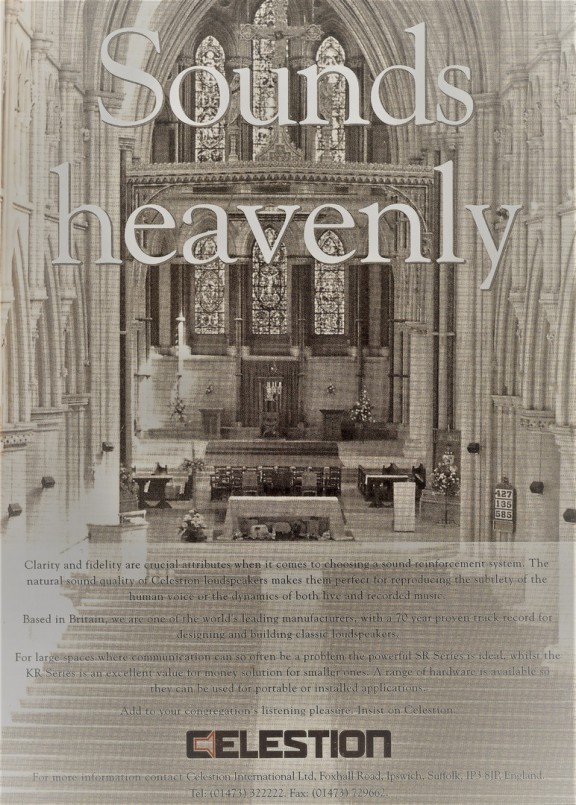Choosing Church Sound System Installers
By Geof Boswell
I have always wondered what happened on the Sermon of the Mount for those that were at the extreme edge of the crowd. Did they hear every word of Christ's sermon? Did they strain to hear and some of them perhaps say to a neibour:
'I can't hear what he's saying..."
I know you may think I'm being flippant, but it does illustrate a point. Even Christ's sermons would have been subject to the laws of acoustics and physics - even if by divine intervention every listener was enabled to hear.
The situation doesn't change because we are living in the 21st Century. The challange to every preacher world wide is to get his or her message across to the congregation.
If the listener cannot hear, or hears only part of the message, then the preacher needs to examine what could be going wrong.
Christ could not call on any reinforcement technology to enable the listener at the edge of the crowd to hear any better. In fact it is only in the years since the invention of the radio that we have had the technology to effectively amplify the spoken word. Even then you can discount the first half of that era when sound amplification was in it's infancy. The only effective amplification up until the late sixties was group amplification, with names such as Selmer, Vox and Wem; or cinema sound systems, employing massive speaker cabinets and lengthybhorns.
A book could be written about the history of sound but when that history relates to sound in worship, then we are talking in infant terms. The sound system in the context of worship is only just out of nappies. Most churches have only dabbled with sound, partly due to a restrictive budget, partly due to a lack of good solid informaton, but mainly due to mistrust of technology 'taking over'.
But the past quarter of a century has seen just that. Technology has taken over the effort of enabling people to hear, while the preacher is very much in control. Dr Billy Graham, Reinhard Bonnke, Luis Palau, are just some of the modern christian preachers whose ministry would not exist without technology playing a massive part in getting the message across to tens thousands of listeners.
There is a massive market for global satellite TV and radio to play in the proclamation of the Christian Gospel, but thinking just about the church sound system in the context of the local church, most chuches have, at the very least considered whether everyone in the congregation can hear what is being said from the front. With a greater lay involvement in worship than ever before and the advent of contemporary music styles within worship, many churches have entered the precarious world of the sound system.
As worship changes, the use of good quality reliable sound becomes more essential in many buildings. The main considerations are choosing the right equipment for the job, having an installation which is flexible and expandable, and the training of your operators.
How do you go about this when you need to seek 'professional' advice? First think carefully about your requirements. Write down your reqirements in laymans terms. After this go on to write down a broad specification of what you would like to see in the way of facilites.
Seek the advice of any members of the congregation with any knowledge of sound engineering or music. Show them your written requirements and specifications. Ask for written suggestions and comments. This will enable you to remain in the driving seat, while taking on their thoughts, but also it will start to build up some enthusiasm and interest within the congregation for what could be an expensive piece of capital expenditure.
It is important having taken the innitiative of this research that you should remain in control until the right person emerges as a likely lay coordinator of your fledgling sound project. I have heard from many church who have problems with the 'wrong' people becoming involved with sound. They dominate the decision making, and often block any real progress that a new sound system could achieve.
Now that you have your broad specification which details your dreams and aspirations, you need to find someone to help you realise them. What ever you do and whoever you approach, you must be sure that they fulfil some basic criteria:
- Do they have a track record of quality work, which has stood the test of time?
- Have they experience of music reinforcement? - will they be willing to listen to your views?
- Do they have at least an empathy with Christian music and worship?
- In sort, do they speak your language?
- Do they have experience of many different styles of sound installation? Are they tied in with just a few manufacturers of sound equipment or are they truly independent? - Have they carried out recent installations in similar circumstances?
- Can one take up references from these churches?
I'm sure you can add your own questions to this vital list.
A very important area is their commitment to helping and educating the church in the new sound and presentation skills. Do they have a commitment to training?
What type of general support and training are they willing to offer after a system has been installed?
One area to be wary of is the offer of unrealistic warrenties. Some companies have offered incredable deals with up to 10 year warrenties and 24 hour, 365 days a year call out. This is a very good offer if they can really back it up. I have my doubts!
Having found some installers from a Christian directory or magazine, ot on-line, from recommendation or reputation, approach at least two and no more than four, to visit the church and discuss the potential installation. Mahjkke it clear that you are approaching others and offer them your paper as background reading.
Try to give as much comprehensive information about the relavant aspects of the churches worship, and offer a plan of the church as well. Expect the meeting with each company to last at least 90 minutes and try to assess their willingness to truly help you, as opposed to trying to sell you a p for you.ile of equipment.
Make it clear you want a detailed quotation. Don't accept any excuses. If they are serious about doing a first class job, they will want you to see that they have really thought out a system for your church, not just a carbon copy of any number of other systems they have installed.
Once you have all the quotations in front of you, it's worth sending a note to the installer to acknowledge receipt of the quote, also ar the same time, giving them an approximate time scale for your decision-making process. This will prompt you to condider the time it may take you to reach a decision, give you a goal to aim for, and give the potential installers an indication of when they may hear from you.
Before committing yourself to anything, ask if they have done similar installations and ask to speak to a selection of their church clients. Ask to see one of the sound systems in action at a regular church meeting.
Finally ask for a demonstration of the basic system they are recommending. This may entail some costs, so don't be put off by this as everyone has to make a living. So offer to cover the cost of the demo and suggest that if the company is successful, you will expect to see 50% of the demo fee deducted from the final invoice.
Do expect the system to sound good and insist on having as many of your trusted advisors present as is realistic. Make sure you put as much varienty of music and speech through the system as you can, so as to evaluate it well. If a consensus of opinion does not like the sound of a system - if it does not sound natural or clear, be sure to make your fears known. If a system cannot sound reasonably natural to the lay ear, then you are most probably going to waste your money.
It will be the priority of any decent sound professional to ensure that you get a good quality sound system that matches your needs. If he or she only tries to sell you the equipment, then you need to cast your net further. If the right sound system is installed the congregation will not even think about it, as it will be transparent.
Public worship in any denomination whether hig or low should be glorifying to God. Therefore we need to be able to say thay we did our best in our contribution to the worship. Poor quality sound only detracts from worship, but good quality sound, which is effortless to listen to, is an aid to worship. This should be our aim, to provide the best possible sound from within our resources.
I remain convinced that many churches the world over are moving in the direction of greater use of sound systems. It is my hope that churches will seriously think through all the ramifications of purchasing a sound system and take as much advice as possible. Set your sights high, don't cut corners; be patient and remember good sound is worth waiting for.




